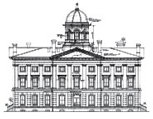Pioneer Courthouse
GALLERIES
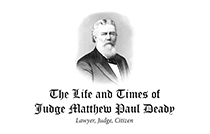
WATCH A VIDEO of the Pioneer Courthouse Historical Society's 2015 Annual Meeting, which featured "The Life and Times of Judge Judge Matthew Deady." This video was created by the Ninth Circuit Historical Society.
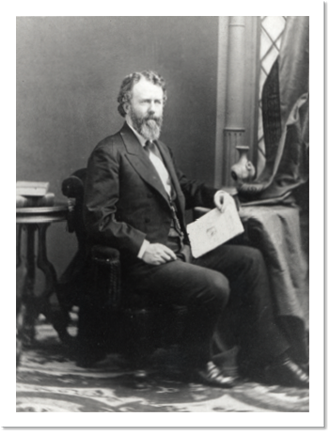
MATTHEW PAUL DEADY
Oregon Jurist & Citizen
Soon after Oregon statehood—February 14, 1859—President James Buchanan appointed Oregon attorney and legislator Matthew Paul Deady judge of the United States District Court for the District of Oregon. For the next 34 years, Judge Deady shaped the laws of Oregon and, as a prominent leader of the state’s new educational and cultural institutions, the lives of his fellow Oregonians.
Throughout his judicial career, Judge Deady made candid, sometimes chatty, occasionally caustic, and often droll entries in his diaries, in which he wrote almost daily about his duties and the personal, social, political, and economic activities of his community. The diaries illuminate for us today many facets of prominent personalities, foundational moments in Oregon history, and humorous as well as tragic events in Portland, as Deady’s town grew from a village of 1,000 souls to a city of 100,000.
The diaries of Judge Matthew Paul Deady shine a clarifying light on 19th-century Portland, and Deady wrote most of the entries here within the walls of Pioneer Courthouse, designed and constructed during the early years of Deady’s judgeship.
DIARY EXCERPT,
October 22, 1875
Moved from old quarters to US Building (Pioneer Courthouse). For near 16 years I have gone in and out of those old rooms, daily, administering justice between man and man as best I could. It is a long time in one place. My new chambers are very fine compared with the old and I may consider myself well fixed…
OREGON & OREGONIANS
THROUGH THE PEN OF
OUR FIRST FEDERAL JUDGE
The Diaries of Judge Matthew Deady
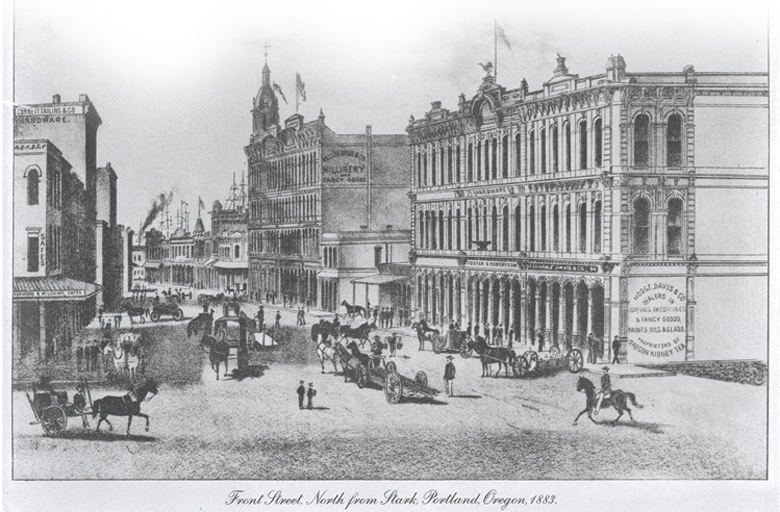
Sponsored by the Pioneer Courthouse Historical Society, this exhibit based on the diaries of Judge Deady
can also be viewed in the east vestibule of Pioneer Courthouse.
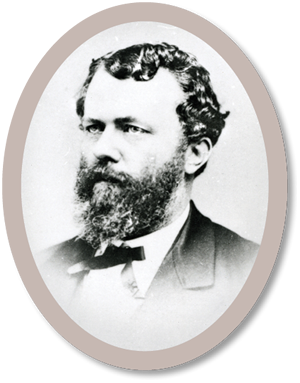
Matthew
Paul
Deady
a brief history
In 1840, at the age of sixteen, Matthew Paul Deady apprenticed to a blacksmith in Barnesville, Ohio, but a term at the Barnesville Academy inspired him to pursue a more intellectual vocation. He taught school briefly, and by 1846 he was studying law under William Kennon, Sr. He earned admission to the Ohio State Bar a year later.
Deady arrived in the Oregon Territory in November 1849, and by March 1850 he was arguing his first case in an Oregon court. That summer he won election to the territorial legislature, where he compiled the first book of Oregon laws and befriended territorial governor Joseph Lane. Through Lane’s influence, President Franklin Pierce appointed Deady to the territorial supreme court in 1853, and he took the office the following year.
In August 1857, a convention met in Salem to frame a state constitution, and Deady was elected its president. Following Oregon statehood (February 14, 1859) Deady accepted President James Buchanan’s appointment to the federal bench as Oregon’s district court judge on March 9, 1859. He then campaigned vigorously for Joseph Lane as the Democratic candidate for vice president during the 1860 campaign, fearing Lincoln was too radical. Secession changed his outlook and he became a Republican during the Civil War, but he never repudiated his earlier defense of slavery.
Deady’s attitude toward slavery and his abhorrence of Southern rebellion derived from his reverence for the law. In later years, that same reverence led to Deady’s steadfast protection of Chinese immigrants against white hostility. In case after case, he cited the precedent of treaties between the United States and China over state and local laws designed to oppress and harass Chinese immigrants. These rulings may have reflected an evolution in Deady’s views, as evidenced by his 1882 decision in On Yuen Hai Co. v. Ross: “The statute…is not only contrary to the treaty with China, but to the dictates of natural justice.”
Deady also showed an inclination toward “natural justice” in other areas of the law. In admiralty cases, he repeatedly rendered decisions that favored ordinary seamen and small merchants against exploitative or negligent officers and shipping companies. He showed a similar skepticism toward terrestrial corporations, consistently rendering decisions against companies he believed were threatening the public interest. In Gilmore v. Northern Pacific Railroad Company (1884), for instance, he rejected the “fellow servant rule,” which nineteenth-century corporations had used to escape liability for workplace injuries by laying the blame on a particular employee or supervisor. Deady instead felt the company should be held accountable for the safety of its workers.
When it came to land disputes, however, Deady was more inclined to a strict interpretation of the law. He tended to favor holders of legal title over settlers who had purchased murky titles in good faith, and many of his decisions were overturned by Circuit Court Judge Lorenzo Sawyer, who emphasized “intrinsic justice.” But not all of Deady’s land-law rulings resulted in inequitable outcomes. In Pennoyer v. Neff (1878), for instance, Deady ruled in favor of Marcus Neff, who had been out of the state when his lawyer John H. Mitchell took possession of his land claim in lieu of payment for legal services. Deady concluded that Mitchell’s half-hearted attempts to contact Neff had been insufficient, and the U.S. Supreme Court later affirmed Deady’s conclusion in a landmark decision.
Deady single-handedly codified the state’s laws in 1864 and 1872, cementing the reputation he had earned as “Oregon’s Justinian” during the territorial period. Moreover, he drafted several of the state’s statutes himself, including the law governing corporations and the incorporation act for the City of Portland.
Despite his responsibilities and accomplishments as a jurist, Deady found his salary insufficient to cover his expenses, in part because the paper money paid by the federal government during and after the Civil War was not worth its face value. To supplement his income, Deady became a correspondent for the San Francisco Bulletin in 1863. His talents as a writer of more than legal opinions are showcased in his 1868 essay for Overland Monthly, “Portland-on-Wallamet.” He wrote, “Among the fir-clad hills and broad rich valleys of Oregon, the bucolic instinct still lingers,” a statement as true today as it was in his lifetime.
Even with all his paid responsibilities, Deady found time for charitable works. He helped organize the Library Association of Portland, participated in the outreach activities of Trinity Episcopal Church, and served as president of the University of Oregon Board of Regents for twenty years. The University of Oregon’s Deady Hall — the first structure built on campus and still in use—was named for him in 1876.
Deady’s health began to fail in the summer of 1892, and doctors eventually concluded he had suffered a stroke. Through sheer force of will he continued to hold court through the winter. He died on March 24, 1893.
~ Oliver Tatom, Oregon Encyclopedia
Further Reading: Clark, Malcolm. Pharisee Among Philistines: The Diary of Judge Matthew P. Deady, 1871-1892. Portland: Oregon Historical Society Press, 1975.
Gaston, Joseph. Portland, Oregon: Its History and Builders, vol. 3. Portland, Oreg.: S.J. Clarke, 1911.
Mooney, Ralph James. “The Deady Years, 1859-1893,” in Carolyn M. Buan, ed., The First Duty: A History of the U.S. District Court for Oregon. Portland: U.S. District Court of Oregon Historical Society, 1993.
from the Deady diaries…
January 19, 1871
Saml Simpson [a local lawyer and poet] called today and asked me to aid him in getting employment on the Daily Oregonian as a writer. Will try. He is a genius, but, as genius too often does, loves whiskey too well …
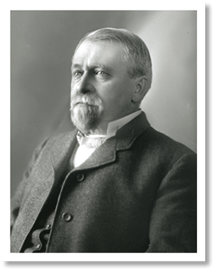
“Mr. Condon is an enthusiast and although a Congregational Minister before he became a Geologist, and still is, I think that in a case of conflict between the Gospel of Christ and the Gospel of the Rocks or rather the Revelations of the Bible and the Rocks, the latter would carry the day with him.”
January 20, 1871
…Saw [Henry] Pittock, proprietor of the Daily Oregonian last evening and spoke to him concerning Saml Simpson. He answered that the newspaper business was so overdone in Portland that he could not afford to employ anymore writers and wrote Simpson to that effect today.
Born in 1835 in England, Henry Pittock arrived in Portland in 1853 and, at the age of 18, became a typesetter for the new weekly (soon to be daily) Oregonian newspaper. Ultimately assuming ownership of the paper, he built it into Oregon’s flagship newspaper. Highly competitive and a shrewd investor in banks, real estate, transportation, and logging and lumbering, Pittock amassed great wealth, which he spent on philanthropic endeavors and his home above the city, today’s Pittock Mansion, owned by Portland Parks and Recreation. A hiker and climber throughout his life, Pittock passed away in 1919, having seen Oregon develop dramatically from his 60-year perspective as a newspaper publisher and businessman.
January 31, 1871
![Rev [Thomas] Condon](deady-web-resources/image/bb004390-DrTCondon-s.png)
… This evening attended a lecture on geology of Columbia River Basin by Rev [Thomas] Condon under auspices of Y M C A at Philharmonic Hall. Took the boys [sons Edward and Paul) and [friend] Alice. A large audience and an interesting lecture. Mr. Condon is an enthusiast and although a Congregational Minister before he became a Geologist, and still is, I think that in a case of conflict between the Gospel of Christ and the Gospel of the Rocks or rather the Revelations of the Bible and the Rocks, the latter would carry the day with him.
Initially an Irish Congregational minister, Thomas Condon (1822-1907) became fascinated with fossils and rocks he unearthed along the Columbia River while working in The Dalles. In 1872 Condon was appointed State Geologist, a post he resigned soon after to become professor of geology at the newly established University of Oregon. Here he built an international reputation as a geologist and author. Deady became acquainted with Condon at the beginning of his career.
stones for Pioneer Courthouse
February 6, 1871
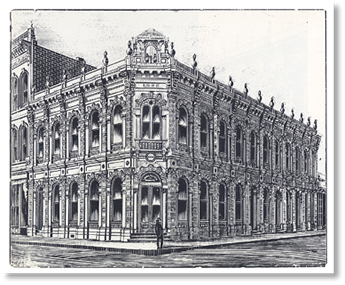
(image from The Grand Era of Cast-Iron Architecture in Portland,
William John Hawkins III)
… Examined the matter of the Contract to furnish cut stone for the U S C H [Pioneer Courthouse] as requested by the Sec of Treas in his letter of Jan 10. Yesterday conversed with Henry Failing on the subject and today with W S Ladd. Both think favorably of giving the contract to Lambert. After careful consideration, I have written a letter to Mr. E St. John advising him that Lambert had a right to take the stone from the ledge in [C]Huckanut Bay [Washington Territory] … and that said Lambert had transferred said right to the U S by a valid and sufficient lease. This opinion was given upon the fact communicated to me by St John that the stone throughout this ledge … the same being about 1 and ¼ miles in length, was of the same quality as in the quarry or pit [already] opened … This is quite a serious responsibility that the Sec has imposed upon me. I have decided as I thought was right, acting as I admit under a desire to give Lambert the contract if I could consistently because I am satisfied that there is some improper but effective means being used to give the contract to Emory of Cal at a cost of nearly 1/3 more to the govt.
February 24, 1871
…Speaking of the L[ibrary] A[ssociation] reminds me that I have forgotten to note that on Ash Wednesday evening I attended a Library meeting when Henry Oxer, an English school master so far as appears, was elected Librarian. He was [P C] Schuyler’s candidate and I hope and trust will make a good officer.
Deady was an early member of the Board of Directors of the Multnomah County Library Association and remained a steadfast and dedicated member for the remainder of his life. It is due to the diligence and efforts of such early library advocates as Deady that, today, the citizens of Portland possess such a fine library system.
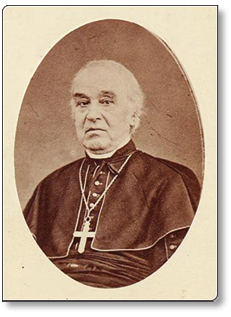
Archbishop Francois Norbert Blanchet
Funeral procession left the Stout’s residence at 10 o’clock …
Archbishop Blanchet made a few Remarks. He thinks in French and attempts to speak in English and the result is not very intelligible. But he is an excellent old man and a very good illustration of a combination of the wisdom of the Serpent and the harmlessness of the Dove.
March 6, 1871
This day came in with a terrible rainstorm. The District Court adjourned on account of [Lansing] Stout’s funeral. [Lair] Hill presented the Resolutions of the Bar and announced his death to which I responded and directed that the resolutions be entered in the journal. Funeral procession left the Stout’s residence at 10 o’clock. Judge Upton, [W F] Trimble, [Jo] Dolph and myself acting as Pallbearers. There was a large procession of the members of the bar, firemen and carriages notwithstanding the inclemency of the day. We marched down Jefferson St. to Third and thence to the Roman Catholic Church. There Mass was celebrated and the Requiem sung. Archbishop Blanchet made a few Remarks. He thinks in French and attempts to speak in English and the result is not very intelligible. But he is an excellent old man and a very good illustration of a combination of the wisdom of the Serpent and the harmlessness of the Dove. The services were conducted by some Belgian Priests whose Latinity smacks strongly of Low Dutch. From the church the procession proceeded down Stark St. to the Ferry, where the pallbearers dropped out and poor Stout was taken across the river [to Lone Fir Cemetery]. What will become of his poor widow and children?
Lansing Stout was a leading member of the Oregon bar. A one-term congressman, Stout was a highly regarded lawyer—hence, the participation of U.S. District Court Judge Deady as a pallbearer—though not successful financially.
French-Canadian born Francois Norbert Blanchet (1795-1883) was the first archbishop of Oregon City (today’s Archdiocese of Portland). Blanchet was one of the first Christian missionaries to arrive in the Oregon Country and established the Catholic Church here.
March 15, 1871
Last night attended Mr. Condon’s lecture on the Geology of Oregon at Philharmonic Hall. The lecturer is a Congregational preacher but I think the Geologist is getting the upper hand of the divine, so that “Christ and him crucified” is entirely subordinate to “The Rocks and Them Stratified.” At the beginning he protested that geology was something certain and not “conjectural” but his lecture was for the most part a tissue of conjectures some of which could not urge the ground of probable cause for their existence.
August 7, 1871
Sat in the Circuit Court and District Court today …[A B} Hallock called and had a long talk about the water supply. I have some doubts about the feasibility of the Holly system for this place, and I think that the Wallamet Falls is the best source for a supply. Have read today 100 page of [J Q] Thornton’s essay on the resources of Oregon. Slow and dry work.
A.B. Hallock was one of the city’s first architects—and the man who built Portland’s earliest cast-iron buildings—and was working on securing a future supply of water for Portland. The Holly System that Deady refers to was a system of filling water tanks atop tall buildings to reduce the need for fire pumping engines. Deady mentions his support for getting water in the future from Willamette Falls at Oregon City. It won’t be until 1895 that the Bull Run gravity-fed water system is installed and that Portland will have a reliable source of clean water.
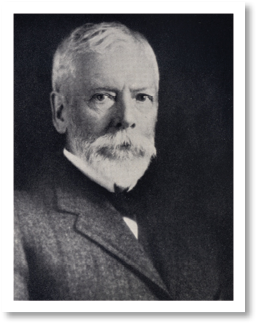
January 22, 1872
In the evening attended the Unitarian meeting and heard Mr. [Rev Thomas Lamb] Eliot on the spirituality and unity of God. He appealed largely to the evidence of our own consciousness, and stated that the doctrine of the Trinity was borrowed from Plato, and was not an established doctrine of the Christian Church until the 6 or 7 century, and was not heard of therein until the 13 century …
Born in St. Louis in 1845, the Rev. Thomas Lamb Eliot moved to Portland, Oregon, in 1867 where he became the first pastor of the First Unitarian Church. Almost from his arrival in still-pioneer Portland, he became a leading influence and force in the growing city’s cultural life. From 1872 until 1876, Eliot was Multnomah County superintendent of schools; following in Judge Deady’s footsteps, he became a director of the Portland Library Association. In 1904 he helped found Reed College. Eliot is credited with creating the Oregon Humane Society, the Boys and Girls Aid Society, the Portland Art Museum, and numerous other institutions, including the Portland parks system. Like Deady, Eliot was a keen observer and commentator on the growth and shaping of Portland. An inveterate diarist himself, he left a body of work that includes decades of sermons, memoranda, letters, and speeches. He died on April 28, 1936, and continues to be recognized as one of Portland’s brightest spiritual and cultural lights.
April 12, 1872
I’ve got Italy printed on the tablets of my brain now. Heretofore, it has been a confused mass of mountains, rivers, valley and lakes…
Attended church … in the evening [Friday]. Read after coming home the two preliminary chapters of Liddon’s Rome; the one on the geography and the geology of Italy and the other on the origin and locality of the primitive population. Found them very interesting and useful. I’ve got Italy printed on the tablets of my brain now. Heretofore, it has been a confused mass of mountains, rivers, valley and lakes…
April 13, 1872
In the evening attended meeting of the Library committee at Ladd & Tilton bank parlor. Out of 40 persons invited to attend to consider plan for providing library a home, only two persons, outside of the directors, attended, and only two wrote excusing themselves. Got to the “Wallamet’s” [theater] rooms in time to hear the closing flight of G.V. Smith’s lecture on “The Want of Individuality in Americans.”
fire!
December 22, 1872
The fire of 1872 destroyed several blocks of downtown Portland. The Fenian Guard is Deady’s contemptuous title for the Emmet Guard, Company B of the 2nd Brigade of the More Militia, which was composed entirely of men of Irish descent. According to newspaper accounts, the Chinese were forced to walk over live coals in their thin slippers on the pretext that they must move hoses or perform other helpful duties.
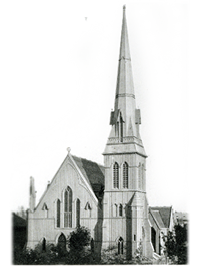
As I started to go to Sunday School, about ½ past 9 A M heard fire alarm and went down on to Front Street, where found the row of wooden buildings on the river between Morrison and Alder on fire. The fire lasted until the middle of the afternoon, when it was subdued. In the meantime it swept from Morrison to Washington on the River and crossed over between Morrison and Alder and burned Carters three story brick and other buildings covering about 1/3 of a block. I moved one wagon load of my library and lost some books by so doing. It is estimated that the loss was about $400,000. The firemen worked hard and exposed themselves heroically to fire and danger, but done little if any good for want of intelligent control and direction. A great deal of labor was performed in what was called saving goods, but in many instances the fire could not have done more harm than the saviors. The poor Chinamen were cruelly used and abused by the Fenian Guards and the street Arabs upon pretense of making them work the engines …
April 4, 1873
[Oregon Episcopal] Bishop [Wistar] M[orris] called to see about consecration of [Trinity Episcopal] church, on June 19. Consulted with the Bishop about taking the Directorship of the University. He advised in the affirmative. Think I will attend the first meeting at Eugene on Monday and help organize the board.
and fire again!
August 2, 1873
About 4 o’clock awakened by cry of fire. Looked out & saw smoke in the SE part of city. Thought it a small fire and returned to bed. Got up at ½ past 7 and found 2 or 3 blocks burned. Went down town and remained until after 12 when fired subsided. The largest fire ever known in the city. It was the work of an incendiary and most likely some wicked anti-Chinese fanatics. The fire department lacked a head or it might have been suppressed in the morning.
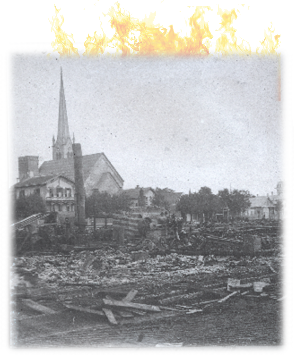
During the summer of 1873 there were scattered reports that persons and firms employing Chinese had received anonymous notes promising retribution, some of them openly threatening arson. Despite a wide-spread belief that the fire of the previous December had been the work of anti-Chinese incendiarists, the municipal authorities took no protective action.
Shortly after four o’clock on the morning of August 2, a special policeman patrolling First Street between Morrison and Yamhill discovered a blaze in the warehouse and showrooms of Hurgren and Shindler, furniture dealers. The flames, fed by stocks of paint and varnish, and by the kiln-dried wood of the furniture, destroyed the building with almost explosive speed, creating a fire storm that swept south along the planked sidewalks and through the frame structures adjoining. Efforts at containment were unavailing. The street reservoirs were quickly emptied and it became necessary to extend long hose-lines to the river. Additional fire companies were brought in from Albany, Salem, and Oregon City by train, and from Vancouver by boat.
By the narrowest of margins, the firemen kept the flames from jumping Second Street on the west, but between there and the river it raged unchecked, burning its way steadily south until it reached Clay Street where it was halted, as much by the fact that here the buildings were widely scattered as by the efforts of the exhausted fire companies. Twenty-one blocks had been severely damaged, 17 of these totally destroyed. First estimates placed losses at $1,150,000. The total was unquestionably much higher.
It was never established whether the original fire at Hurgren and Shindler’s was incendiary, but clearly other blazes that broke out inside buildings at a distance from the main conflagration were, and the blame fastened upon the anti-Chinese activists. This, and the fact that the Irish toughs of the Emmett Guard treated the Chinese with even greater brutality than in December caused a general revulsion. The so-called Chinese Question ceased to be a factor in Oregon politics for nearly a decade.
January 9, 1874
Dispatches brought news that [George H.] Williams had withdrawn [from consideration as chief justice of the United States Supreme Court]. A sad day for Williams and I can’t help feeling sorry for him, although I know he has brought it on himself. When he removed Gibbs to prevent the prosecution of bribers and repeaters in this district at the dictation of the parties interested and implicated in the commission of the crimes he done that which caused his virtual rejection, and deservedly so.
George Williams was chief justice of Oregon’s territorial supreme court and a member of the constitutional convention. As a Republican U.S. senator (1865-71) from Oregon, he helped floor-manage the fight to convict President Andrew Johnson on impeachment charges. Although he was President U.S. Grant’s attorney general, 1871-75, and was nominated to be chief justice of the Supreme Court, Deady had no high opinion of his legal abilities. His second wife, Kate, was a curious compound of social elegance, loose language, and unVictorian behavior. It was rumored that the wives of the Supreme Court justices lobbied members of the senate to defeat Williams’ nomination so the Court wives wouldn’t have to associate with Kate. Williams remained as Grant’s attorney general until 1875, when he returned to Oregon. He served as Portland’s mayor 1902-1905.
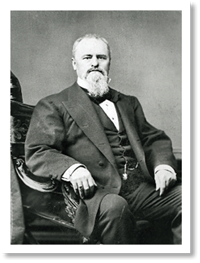
October 15, 1875
Saw [Ben] Holladay on the ground a moment. The first sight I have had of him since his return. [George] Helm met him yesterday and denounced him in the presence of his wife and a crowd as a d_____d scoundrel, coward and dirty dog. He took it as the sow takes her swill. I suppose anybody can insult him now. He is on the downgrade.
Ben Holladay acquired in 1868 a controlling interest in the Oregon Central Railroad, which ran on the eastside of the Willamette River down to California. On the eastside, he endeavored to establish a competing city to Portland. An arrogant, aggressive and wholly unscrupulous man, in the words of Deady’s diaries’ editor Malcolm Clark, Holladay had a genius for promotion unbalanced by any sound understanding of financial realities and his various ventures collapsed under the weight of impossible interest payments, senseless extravagances, and the high cost of supporting hired politicians. George Helm was a prominent Linn County attorney engaged in statewide affairs and respected by Deady.
Pioneer Courthouse completed
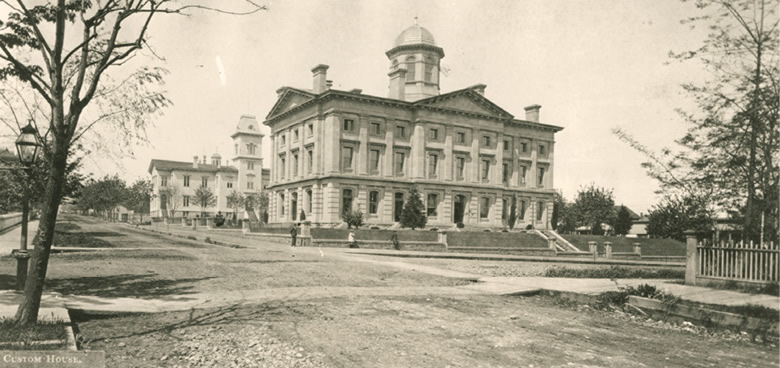
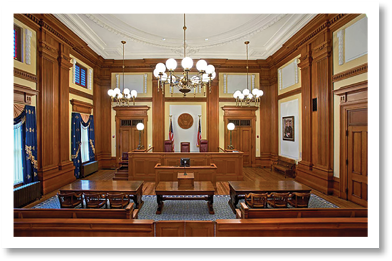
Deady moved into this building on October 22, 1875. He calls it the “US Building” as it is contains almost all the offices and functions of the federal government in Portland, including the Post Office, Customs Office, District Court, and probably offices for some executive officials.
October 22, 1875
Moved from old quarters to US Building. For near 16 years I have gone in and out of those old rooms, daily, administering justice between man and man as best I could. It is a long time in one place. My new chambers are very fine compared with the old and I may consider myself well fixed…
January 3, 1876
Went with Mrs D[eady] to the Opera at the new Market Theatre. Had a scene from “Travatore” and other things. Pretty well done.
The New Market was Portland’s first “mixed-use” building, holding a market on the main floor, a fine restaurant above, and a theater that could seat more than 1,200.
Went with Mrs Deady to the Opera at the new Market Theatre. Had a scene from “Travatore” and other things. Pretty well done.
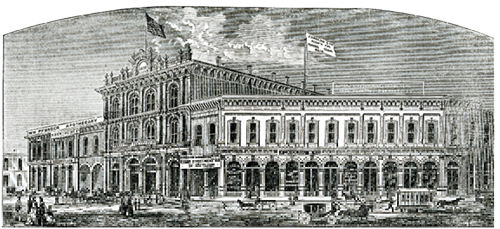
May 24, 1877
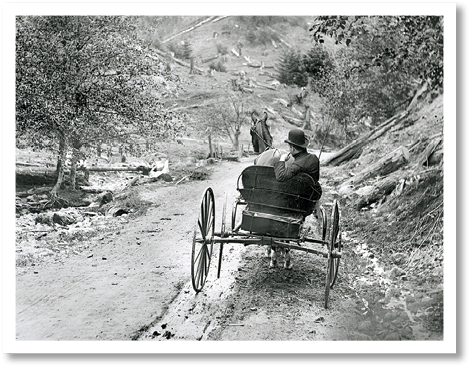
Attended the banquet of the British Benevolent Society at Sols Restaurant. Sat down at ½ past 7 and rose up at 2. About 25 persons present. Laidlaw presided and Macleay was vice… [Erastus] Shattuck, … [John] Cran and myself and others made speeches. I responded to the toast to the United States and read the first and last two verses of Tennysons “Hands all round.” I done tolerably well … I also was called and responded to the toast to Portland and gave an account of the construction of the Plank road through the Canyon which enabled the Ox teams and ships to meet and exchange cargoes on the river at Portland and hence the commercial metropolis.
Beginning in 1851 a plank road was built through Tanner’s Creek canyon (Jefferson Street, through Goose Hollow, and up Canyon Road out through Washington County) giving farmers in that rich wheat-growing area access to the river and essentially establishing Portland’s position as the principal port along the Willamette and Columbia rivers.
February 2, 1878
Wednesday evening I attended Mr. Eliot’s 3[rd] lecture on his “broad” that he took last year. This one was upon Florence with a large digression upon Dante and Angelo. It was pleasant and entertaining. The little man was quite ambitious in some passages. His strong, resolute, nervous wife sat near me and I had a good opportunity to observe her. She never took her eyes off him during the hour of the lecture, and looked as if she was in labor every line of it.
In addition to all of his duties in Portland (Unitarian minister, school superintendent, board member of several humanitarian organizations) Rev. Thomas Lamb Eliot was an inveterate traveler. Here Deady describes Eliot’s lecture upon his return from a European trip that included Italy.
February 2, 1878 [continued]
The Oregon Medical College was the predecessor to the University of Oregon Medical School, now part of OHSU. Creed Turner, whom Deady mentions here, was hanged for murder.
The New Market Theater, shown in the January 3, 1876 entry, was not only the city’s major stage; it was also the location for the community’s large fundraising occasions, such as the one Deady describes here.
Attended a meeting of the corporation of the Oregon Medical College Monday evening, when they approved a draft of Articles of incorporation drafted by [attorney] Cy Dolph and supervised by myself. I am to be Prof of Med Juris[prudence] and must prepare 15 or 20 lectures on the subject by next fall. Considering how little I know upon the subject, it is quite an undertaking. Have not given any attention to M J [Medical Jurisprudence] since I defended Creed Turner for murder at Hillsborough in the fall of 1851.
March 2, 1878
Wednesday evening attended the Entertainment at N[ew] M[arket] theater given by the ladies of Trinity Parish Guild for the benefit of the Orphanage. An excellent affair. The whole gallery is said to have been the most attractive feature of the entertainment. I learned the affair netted $500. Friday evening attended a large party at Mrs. H W Corbett’s with Mrs. D[eady]. A great jam and some of many kinds there, but on the whole it was a decided success and a very enjoyable affair. The rooms of furniture and decorations were a feast of themselves. The hostess was charming but the refreshments were only so so. I have not seen Mrs. D look as well for many a day—she was in red silk—decollet [sic] very much.
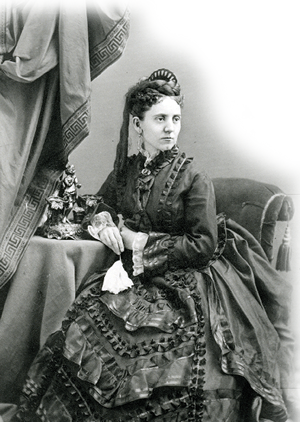
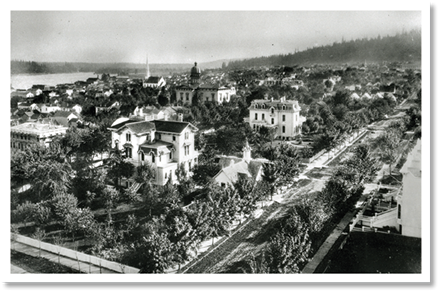
prominent venues for social events.
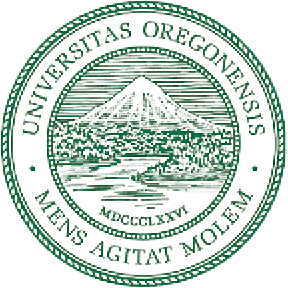
The Latin inscription that Deady helped provide for the University of Oregon’s seal translates as: “Minds move matter” or “Minds move Mountains.”
March 2, 1878 (continued)
This week I have given some time by reading and correspondence to ascertaining the best Latin equivalent for “The University of Oregon” to be used on the University seal. Have not yet settled the matter. The proposed motto—Mens agitat molem—I find is the 6th B[ook] of the [A]Eneid [line] 727. It is well descended and very appropriately surrounded…
March 15, 1879
Friday James Johnson & Archie Brown, the O’Sheay robbers, were hung shortly after 2 o’clock in the jail yard. I had a ticket but did not attend. Great crowds of people collected on the outside and stood there for hours, although they could see nothing. I was very strongly urged to sign the petition commuting their punishment to imprisonment for life, but refused on the ground that the state courts having determined that they were guilty of murder in the first degree I ought not being a federal judge to any act which could be construed into a reflection to the contrary and that morally they deserved hanging.
General Grant visits Portland
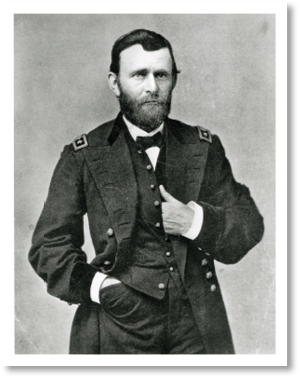
October 18, 1879
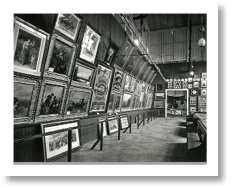 Joined the procession in honor of Genl [Ulysses S.] Grant, who arrived from Vancouver at ½ past 2 PM. Rode in the Second carriage with ex Senators Corbett, Kelly, and [A.A.] Sargent. The procession was simply immense. The day was cloudy and threatening rain, which finally came down in a gentle shower at the public school where the children met the Genl. In the evening Paul and I visited the Mechanics pavilion, where Grant met the Wright Post of the GAR[Grand Army of the Republic].
Joined the procession in honor of Genl [Ulysses S.] Grant, who arrived from Vancouver at ½ past 2 PM. Rode in the Second carriage with ex Senators Corbett, Kelly, and [A.A.] Sargent. The procession was simply immense. The day was cloudy and threatening rain, which finally came down in a gentle shower at the public school where the children met the Genl. In the evening Paul and I visited the Mechanics pavilion, where Grant met the Wright Post of the GAR[Grand Army of the Republic].
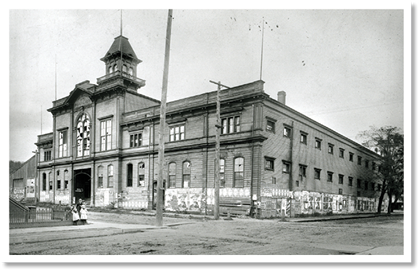
Civil War general and post-war president (1869-1877), Ulysses S. Grant was considered a great leader on the battlefield, but his presidency was marred by poor administration and scandal. He visited Portland again in 1883 to help inaugurate the arrival of the Northern Pacific Railroad and the city’s rail connection with rest of the nation. Deady hosted Grant then and gave him a tour of the Pioneer Courthouse. President Grant, who had left office two years before his visit to Portland, was taking a grand tour of the country. It was indicative of Deady’s stature in the community that he was included in the president’s party.
Wednesday Mrs. Deady and I accompanied the Grant party to the Cascades and back, having gone on board the night before. The excursion was quite a pleasant one. In the evening we attended the reception in the Pavilion. Strong’s speech and Grant’s reply were very good for the occasion—better than they are in the habit of I think. Nothing could be heard of either except by those within a few feet of them, but they were read in the papers the next morning by thousands. Thursday sat in the C[ircuit] C[ourt] and heard the Dalles Mission cases. Declined an invitation to go to Salem with the Grant Party. Friday. The Grant party left on the St Paul this morning for S F and old Mt Hood which had obstinately veiled his majesty all the time the party were here came out gloriously in a spotless robe of fresh snow.
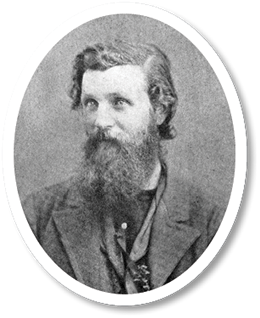
Naturalist and conservationist John Muir was on one of his regular lecture tours when he visited Portland. A severe critic of most public speakers, Deady’s complimentary tone about Muir’s lecture says a lot about Muir as a speaker.
January 17, 1880
Heard a lecture by John Muir on Monday on the glaciers of Alaska & California, quite interesting and instructive. Took Paul with me. This is a beautiful day, the first sunshine for some time. Called at the [St. Helens] Hall with Mrs. D where I left her and attended Muir’s second lecture.
September 10, 1881
… Friday went to Eugene to attend a meeting of the [UofO] Regents and came home on Saturday. Staid all night with Prof Condon and enjoyed his botanical and geological talk very much. He gave me some cones taken from the Picea amabalis and nobolis found in the Cascade Mts near the Columbia … Passed a resolution of thanks to Mr. Villard for his donation to the University at the Regents meeting.
April 28, 1883
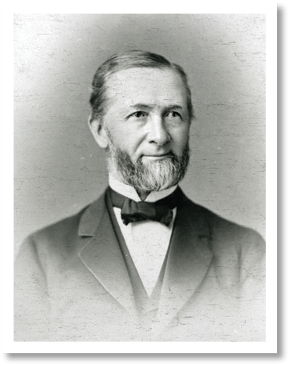
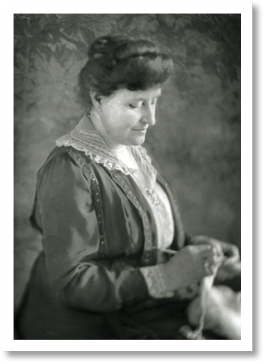
… [U.S. Circuit] Judge [Lorenzo] Sawyer arrived on Monday evening and sat in the Circuit Court on Tuesday, Wednesday & Thursday . . Wednesday evening Sawyer and I dined at [Henry] Corbett’s. The dinner was given to [Henry] Villard. There were about 15 persons present and it was the most stylish affair I was ever at in Oregon. Mr. Corbett sat at the west end of the table and {William S.] Ladd at the east. Villard sat at Corbett’s right and Sawyer on his left. I sat at Ladd’s right and [C H] Prescott at his left. Mr. [William] Mead, the architect of McKim & Mead of N Y sat at my right and I found him an intelligent, agreeable fellow. After dinner we went to the Orchestral Union Concert.
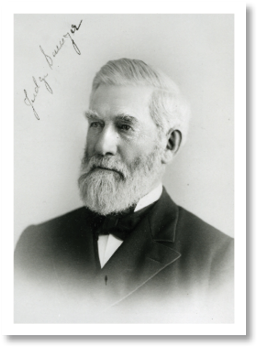
Wednesday
evening Sawyer
and I dined at
[Henry] Corbett’s.
… There were about
15 persons present
and it was the most stylish affair I
was ever at
in Oregon.
Judge Lorenzo Sawyer routinely visited Oregon to sit with Judge Deady on the Circuit Court, an intermediate federal court between the Supreme Court and the district courts, that had both trial and appellate jurisdiction. The dinner Deady describes would have been a grand occasion, with two of Oregon’s most distinguished businessmen (Corbett and Ladd). The architect William Mead was in town to work on the design for Henry Villard’s planned hotel at the center of town, which would, after a decade of delays, become the Portland Hotel. Mead hired the young architect William Whidden to oversee the project. While Mead returned to New York, Whidden remained in Portland, soon bringing his college friend Ion Lewis to Portland to join him on the project and, ultimately, in establishing the successful firm of Whidden and Lewis.
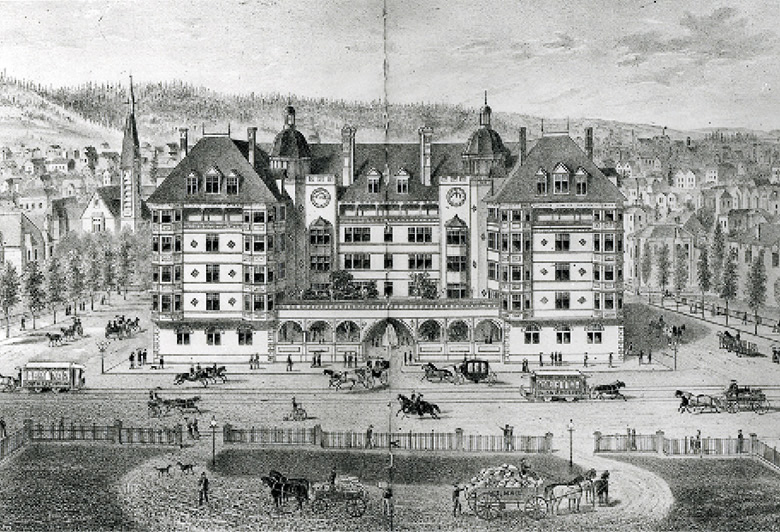
May 19, 1883
… Got a letter the other evening from Gilfrey enclosing a letter from Edmond Mallet giving [Gabriel] Franchere’s orthography of Wallamet in the original edition of his narrative, a copy of which he possesses. It is Wollamat and proves my theory that the word is Indian and that the first syllable has the broad sound of a.
In this entry Deady is referring to Major Edmond Mallet, Chief of the Land Division of the General Land Office and an authority on French-Canadian history. Gabriel Franchere was a French-Canadian explorer and author who visited Oregon early in the 19th century. His book Narrative of a Voyage to the Northwest Coast of America provided one of the earliest published descriptions of the Pacific Northwest and was an effort to correctly spell native and given place names of the era. Here Deady references the spelling of Willamette, which described a place at the foot of the falls of the river of the same name, near present-day Oregon City, where Indians from numerous nations gathered to fish.
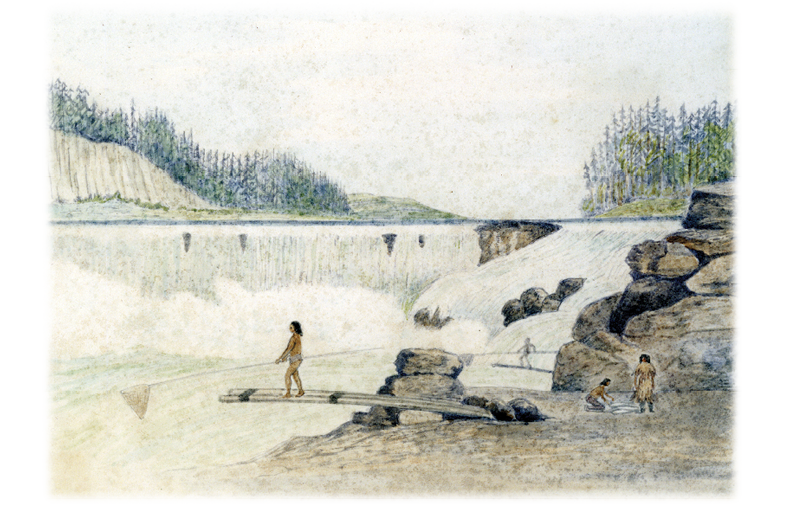
…It is Wollamat and proves my theory that the word is Indian
and that the first syllable has the broad sound of a.
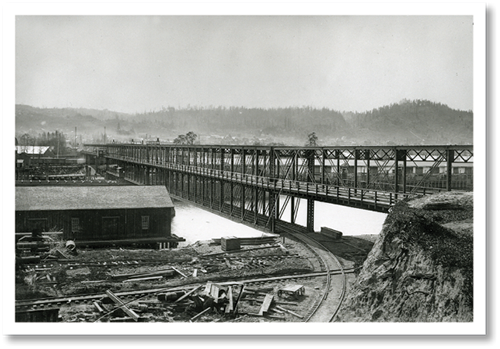
August 11, 1883
… This afternoon walked down to the site of the proposed railway bridge, some ½ mile below Weidler saw mill, visited the office of the engineer and saw the plans. The draw is 170 [feet] in the clear on either side of the pivot pier, and the distance between the shore piers about the wharf line is 1186 feet. This portion is to be iron. The deepest water is fifty feet at high and 22 at low. Rode back on the car up 15th and down Washington …
Here Deady is referring to the first Steel Bridge, completed as a railway span across the Willamette, in approximately the same location as the current bridge, in 1888. In 1883 the streetcars were still horse-drawn. It would be another six years before electric streetcar service began in Portland.
August 25, 1883
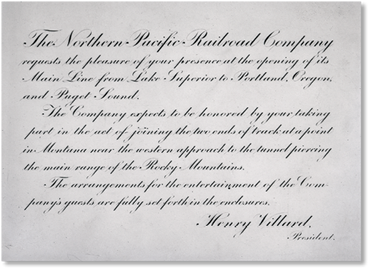
… Wrote yesterday accepting Villard’s invitation to the “spike driving” on the N[orthern] P[acific] on the 8th inst, the train to leave here on the 5th inst. The names of the invited guests were published this morning in the Oregonian. The Oregon list is notable both for its omissions and commissions. The Judges of the supreme court among the former and the collector of this port among the latter. But he may have transcontinental connections. In my University [of Oregon] report I was called upon to notice Villard’s donation of $50,000 of N P bonds to the Regents. I think I have done it in a way that will be acceptable to him, without indulging in any personal adulation or gush, and at the same time point a moral in the right use of riches for the benefit of our local closefisted, narrow-visioned millionaires.
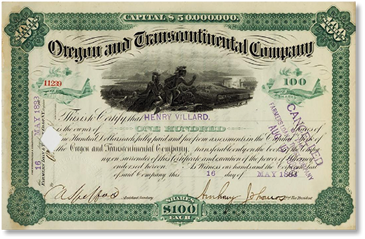
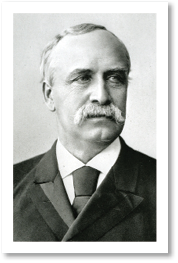
Wrote yesterday accepting Villard’s invitation to the “spike driving” on the Northern Pacific…
The arrival of the Northern Pacific in September 1883 opened Portland to trans-continental train service. In his diary Deady describes in detail the events surrounding the “spike driving,” even if, in his opinion, the invitation list was somewhat flawed in its inclusions and exclusions. Northern Pacific chairman Henry Villard’s gift of $50,000 in bonds to the University of Oregon, which Deady undoubtedly played a role in, was a large donation, resulting in the Regents naming Villard Hall for him. Deady’s crack about Portland’s “closefisted” millionaires reveals something about the challenges of his work as a fundraiser for the University, the Library Association, Trinity Church, and other charities.
December 1, 1883
On the 10th ult Messrs Corbett, [Henry] Failing, and Ladd wrote me a note asking me to select and accept a family lot in River View Cemetery in consideration of the service I had rendered them in the organization of the Association. The letter was written by Mr. Corbett and was doubtless well meant but the language is not well chosen, and if it was not for Edward Failing through whom the request was made and who has a just appreciation of the value of my service, I don’t think I would accept the offer … Among other things, I prepared a long and complicated deed of trust by which the Cemetery property was vested in the trustees to … purchase and improve the property. Five hundred dollars would have been a good fair charge for the service and $250 a very small one. Besides this, I drafted a set of by-laws for them and helped to do the same with a set of rules, which was worth as much more. The lots range in value from two to $800 and I expect to select one valued at $375 and I suppose they will think they have given me a lot …
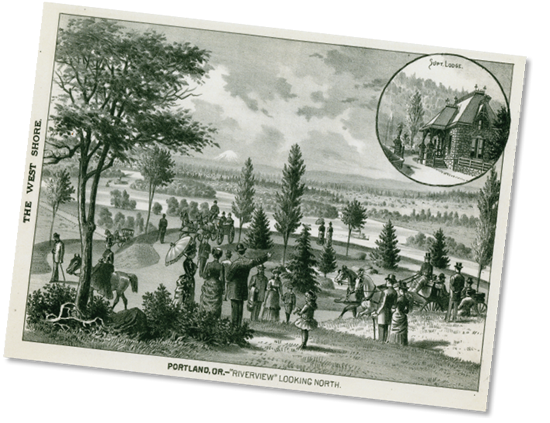
Riverview Cemetery is the final resting place of numerous Portland founders and leading families, including the Deadys. As a sitting federal judge, it was questionable, even then, for Deady to be expecting a fee or a commensurate remuneration, for helping Corbett and his peers purchase the land and organize the Cemetery’s association. His irritation at being presumed upon is obvious (though we must remember that, at the time, his diary was a private journal).
Grover Cleveland Elected President
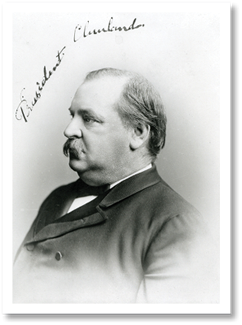
November 16, 1884
… About 1/2 past 10 o’clock went down to the Oregonian office and met the news from New York that indicated the election of Cleaveland [sic] which was this morning after many fluctuating reports has been finally confirmed. I hope Cleaveland will prove true to his civil service record and general disposition to administrative reform, and if he does, his elevation to the Presidency will be a great benefit to the country. But the greater portion of the party [Democratic] behind him have no sympathy with him in this respect and there lies the danger…
The nation’s 22nd and 24th president, Grover Cleveland is the only president to have served two non-consecutive terms (1885–1889 and 1893–1897) and the only Democrat elected to the presidency during an era (1861-1913) of Republican political domination. Cleveland’s battles for political reform and fiscal conservatism, which won him praise for his independence and integrity, made him popular among American conservatives of the era, hence Deady’s positive reaction to the news of Cleveland’s election.
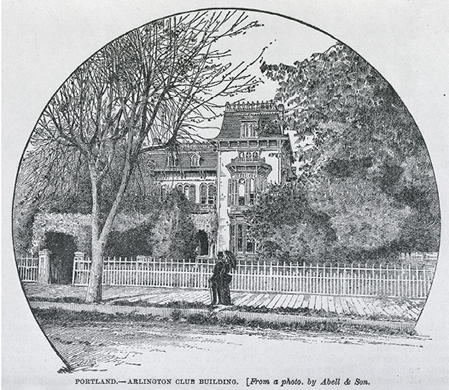
Portland’s Arlington Club was the city’s principal private social club for men. Founded in 1867 by 35 of Portland’s leading businessmen, Arlington Club offered men a place to meet to socialize and discuss issues of financial, political, and social import in Oregon and the country. During Deady’s time, and for much of its first century, the club excluded minorities and women. Deady would have found camaraderie and intellectual stimulation among the socially and professionally elite Portland men who were members. Donald Macleay, a leading merchant and banker, was one of the Club’s founders and also donated land to the city that became Macleay Park in northwest Portland.
April 25, 1885
… Dined last evening at the Arlington Club with Mr. Macleay … Sat at the table until 12 and sipped champagne and chatted about the Old Country and the New Burns, Walter Scott, &c, &c. Very pleasant evening …
July 25, 1885
… Grant died Thursday morning at 8 o’clock and we had the news the same morning in the Oregonian for breakfast. Three hours difference made [this possible]. Died from a cancer produced by excessive smoking—“Better is he that ruleth his spirit than he that taketh a city.” Everybody is trying to out-mourn his neighbor—or appear to. If he had died a year ago, the result would have been very different. He was great I suppose in war but certainly little in peace. He meant well enough probably, but his taste for low company kept him in a bad atmosphere. His second term as President was the most corrupt and low we ever had or have had since…
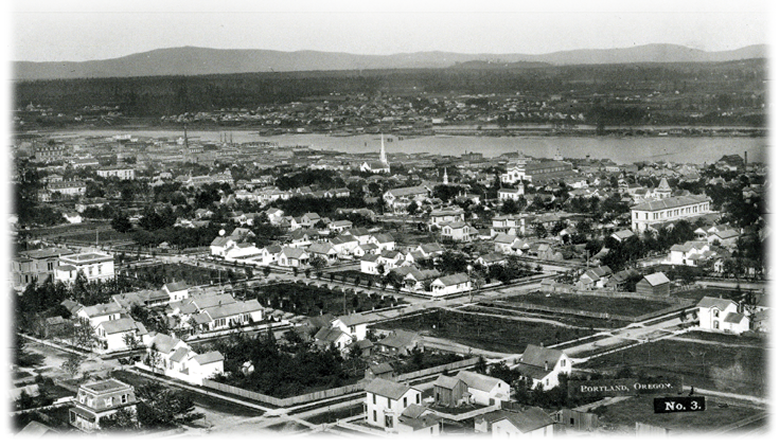
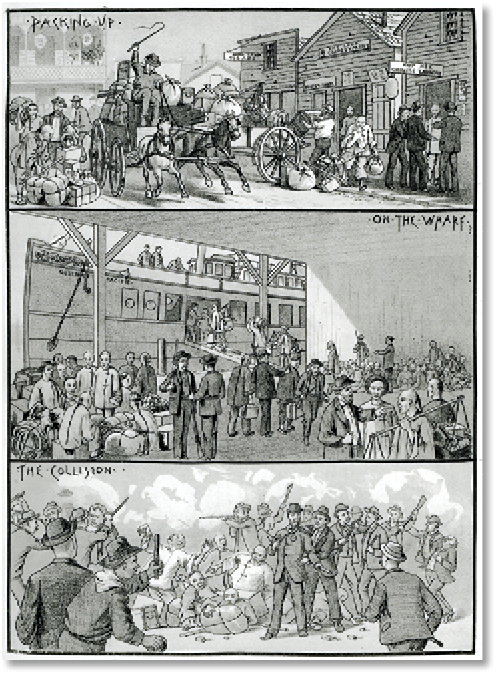
anti-Chinese
riots in Portland
February 27, 1886
… Gov. [Zenas] Moody called on me this morning and talked over the situation with reference to the anti-Chinese demonstration. I advised him to issue a proclamation by the 10th or 15th of next month based on the action of the so-called Congress here and the expulsion of the Chinese from Oregon City since, stating the right of the Chinese here and warning all persons against undertaking to carry out the direction of the Congress and the penalty they would incur if they did. I think he will. Said he had been thinking of it.
March 27, 1886
… Tuesday empaneled Grand Jury and delivered charge to them—the part relating to the anti-Chinese rioters was in writing and was published in the Oregonian the next day—the 24th. It reads well and I have had many compliments for it—both as to matter and manner. But I suppose I will get scorched for it in the Alarm and Pulse that are issued today.
During the mid-1880s, following the passage of the Chinese Exclusion Act of 1882 and as the nation was working its way out of three years of depression, Portland’s Chinese residents fell victim to several anti-Chinese demonstrations and riots that resulted in injuries, vandalism, the destruction of property, and their eviction from the city. The Chinese Exclusion Act was a federal law signed by President Chester A. Arthur on May 8, 1882, that allowed the United States to suspend Chinese immigration. The law was repealed in 1943. While hardly pro-Chinese, Judge Deady saw injustice in both the Act and in the anti-Chinese riots in Portland, issuing a number of rulings from the bench against the rioters. The Oregon Alarm and the Pulse that Deady mentions were anti-Chinese newspapers published in Portland in 1886. Elected chairman of the Anti-Coolie Club, local politician Sylvester Pennoyer appreciated the risk that the on-going anti-Chinese fury would have on his chances of being elected governor and urged his followers to seek relief in the ballot box, rather than on the street, thereby quieting the commotion.
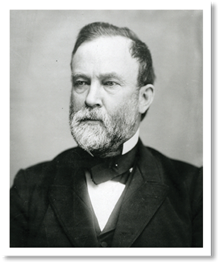
On Wednesday Sylvester Pennoyer was inaugurated Governor of Oregon …
at which he gathered together all the grievances, crochets and whimsies of his life … He has made a laughing stock of himself as I knew he would if elected.
January 15, 1887
… On Wednesday Sylvester Pennoyer was inaugurated Governor of Oregon and delivered a message to the Legislature in which he gathered together all the grievances, crochets and whimsies of his life. He criticized my judicial action in several cases as usurpation and said that if the offense was repeated it would be the duty of the legislature to memorialize Congress for my impeachment. He has made a laughing stock of himself as I knew he would if elected.
As governor (1887-1895), Sylvester Pennoyer resisted the creation of Portland’s Bull Run water system and only after repeated efforts finally relented and signed legislation providing for the sale of the construction bonds necessary for paying for building the Bull Run dam and pipes to carry water to the city’s new reservoirs. For his obstinacy, he earned the sobriquet “Pillvester Annoyer.”
December 31, 1887
… Since Thursday the 23 inst I have obtained 10 perpetual members for the Library Association, which constitutes an addition of $2500 to the Book fund, and $250 in cash for the purchase of Fechheimers picture for the Library. Attended a Library meeting this evening in which the Whidden plans for the new library building were examined and discussed, with a decided preference for the north front plan.
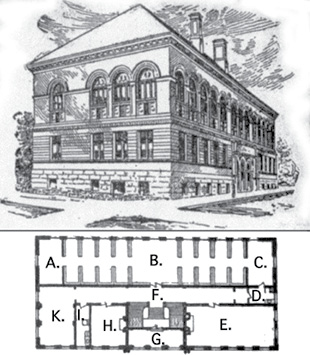
Deady continues his role as a fundraiser for the public library. Here he also refers to William Whidden, who, with his partner Ion Lewis, formed the city’s most prominent architectural firm, Whidden & Lewis. Morris Fechheimer, a prominent Portland merchant who had recently died, was also active in the Library Association and a long-time friend of the judge.
June 16, 1888
… Friday, Pioneer day attended the meeting and heard the speeches. Condon delivered an interesting thoughtful address but marred it by the adoption of the Whitman Myth. Eisha Applegate delivered the occasional address. He labored a good deal but did not bring forth much. There was some coarse gold however in his sluices.
The Oregon Pioneer Association held annual summer picnics at which speakers regaled the audience with stories about crossing the continent and establishing homesteads and towns in Oregon. Deady was a constant presence at these festive gatherings. Thomas Condon was the Professor of Geology at the University of Oregon and Elisha Applegate was a member of the Applegate family of southern Oregon.
Bull Run water
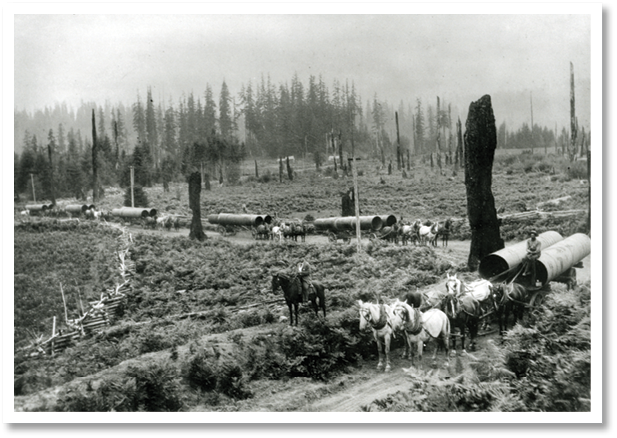
January 5, 1889
… Am engaged in drafting an act for H[enry] F[ailing] to enable the water committee to issue bonds and bring us the Bull run water. Had a consultation with H F on the draft in the evening and it was settled. Had a typewriter copy of it made next day and sent to him. I see that the water committee have since adopted the act with one amendment—striking out the clause authorizing the interest on the new bonds to be paid in New York, which was right. People that don’t want their interest payable in Portland can let the bonds alone.
Deady was providing legal assistance to the Portland Water Committee, which was charged with raising funds for the Bull Run water system by selling bonds. It was Governor Pennoyer’s resistance to allowing the sale of such bonds that made him persona non grata to Portland’s leading citizens, including Henry Failing, Henry Corbett, and other members of the Water Committee
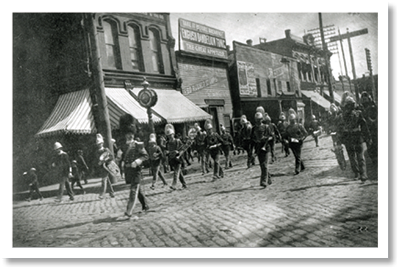
July 4th parades were traditional in 19th century Portland (before the advent of the Rose Festival and its associated parades) and were occasioned by speeches, hence Rector Cole’s “oration.”
July 5, 1890
… Friday the 4th was a lovely day. The sky was just sufficiently overcast to make the temperature pleasant—about 65 in the shade. I did not ride in the procession, for fear of the jolting, but sat on the stand and heard Mr. Cole, the Rector of Trinity deliver one of the best orations I ever heard on such occasions, and also deliver it well without note or memorandum. In the evening attended the exhibition of fire works on the river, as the guest of the Committee on the Potter. They were very good, and the fleet of small boats and canoes illuminated with Chinese lanterns, as they moved over the water in long lines and circles, gave a fairy like appearance to the scene.
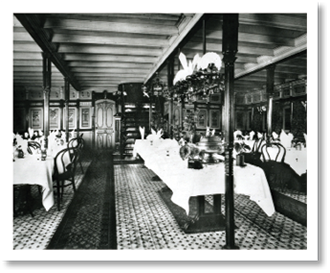
At this stage of his life, Judge Deady was suffering from numerous bladder conditions and, so, was reluctant to ride in carriages that might be jolting.
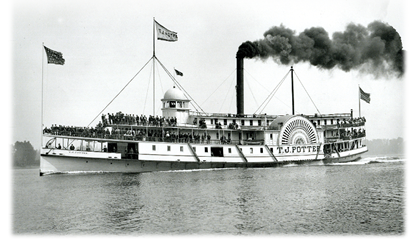
Deady was privileged, as an honored citizen, to observe the fireworks from the deck of the T.J. Potter, one of the city’s most-famous sternwheelers.

November 15, 1890
… In the afternoon went to my chambers and prepared notes for the decision of Joseph Kelley’s Habeas Corpus case in the Circuit Court on Monday.
Sat in the C[ircuit] C[ourt] and D[istrict] C[ourt] during the week. Monday gave decision in the C C discharging Kelley from imprisonment on the ground that no crime having been committed in Clatsop county by the petitioner [Kelley], the justice [of the peace] of Astoria had no authority to commit him. The decision was published in Tuesday’s Oregonian.
Joseph “Bunco” Kelley was a notorious crimp in Portland, accused of “shanghaiing” men for forced service on ships about to leave port that needed crew members. Kelley personified the reputation of Portland as the “capital of shanghaiing” on the Pacific Coast during the late 19th century. He did his work in Portland; hence Deady’s decision that Kelley’s crime was not committed in Astoria, therefore the local justice of the peace had no authority to imprison him. Kelley was generally despised by most Portlanders, though the Portland Board of Trade may have looked favorably on the decision, as the Board had an interest in seeing that ships leaving Portland had full crews and were kept safe from “harassment” by officials in competing ports, such as Astoria.
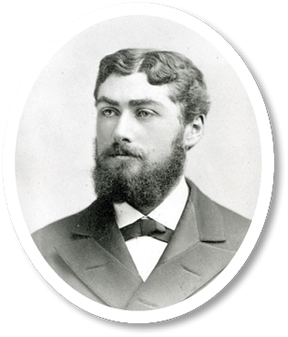
April 18, 1891
… Thursday evening dined at Mr. C E S Wood’s . . The dinner was elegant and his house and furnishings are delightfully picturesque. Enjoyed a Caviare Salad, the first time I ever did relish the stuff…
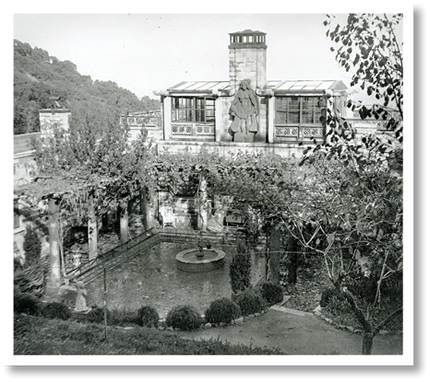
Charles Erskine Scott Wood was a distinguished and provocative Portland attorney and former Army officer. During his military career he befriended the Nez Perce leader Chief Joseph. As a lawyer he was famous for representing both corporation representatives and radicals, adroitly having them enter his law offices by different doors. Wood was also an accomplished author and painter. The conversation at dinner between Deady and Wood, two titans of Oregon’s early history, must have been, like Wood’s dinner, rich and satisfying.
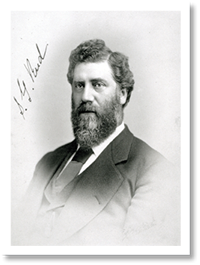
June 13, 1891
… I concluded today my subscription for $40,000 for the endowment of the library. I stood at $35,000 for a long time and began to be afraid I was going to fail. I went to Mr. Simeon Reed as a last resort and asked him to take another $5,000 which he did without a word and paid me the compliments to say that he did it on my account more than otherwise. I felt happy you may rest assured.
July 11, 1891
… Wednesday went to Eugene with Mrs. Deady to attend commencement and annual meeting of the Regents [of the University of Oregon].
These two entries to the diaries illustrate Matthew Paul Deady’s enduring civic engagement as a trustee of the public library and regent of the University of Oregon. The fact that he was able to raise so much money for the library suggests either his skills as a fundraiser or the power of a judge to obtain donations; probably both. Today, judges are precluded, for ethical reasons, from asking for money.
Judge Matthew Paul Deady continued to write in his diaries until November 1892. He passed away in March 1893, after nearly 34 years as a federal district judge for the District of Oregon. His record of achievement and personal influence as an Oregon judge may never be equaled. With few others in Oregon history, he personified the role of the engaged citizen. His collected diaries are held by the Oregon Historical Society. Edited by Malcolm Clark, Jr., they were published by the Society in 1975 under the title, PHARISEE AMONG PHILISTINES: The Diary of Judge Matthew P. Deady, 1871-1892. The Pioneer Courthouse Historical Society, which produced this exhibit, is grateful to the Society for this publication and the photographs that illustrate the exhibit. Sponsors of the exhibit include the Attorney Admissions Fund for the United States Court of Appeals for the Ninth Circuit, the Attorney Admissions Fund for the United States District Court for the District of Oregon, and members of the Pioneer Courthouse Historical Society.
